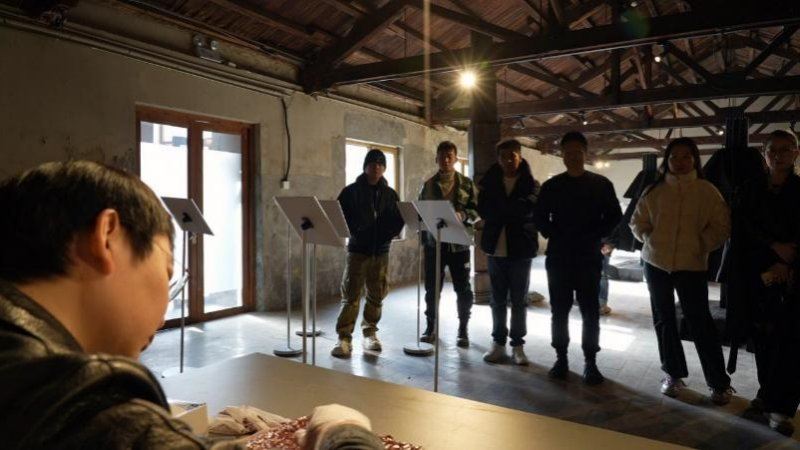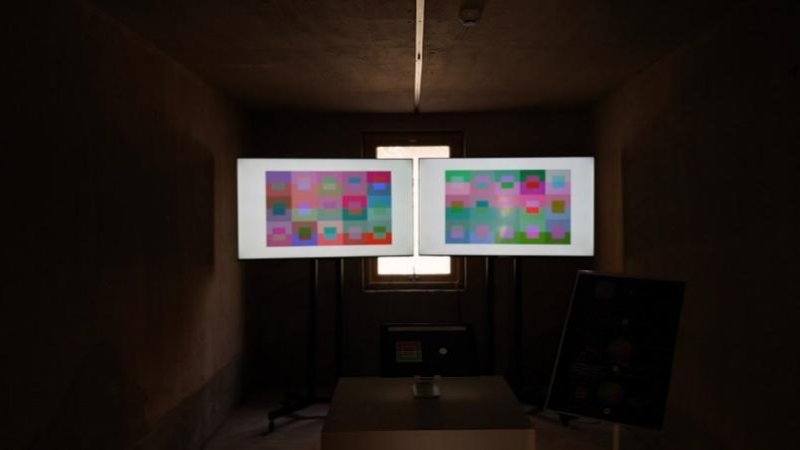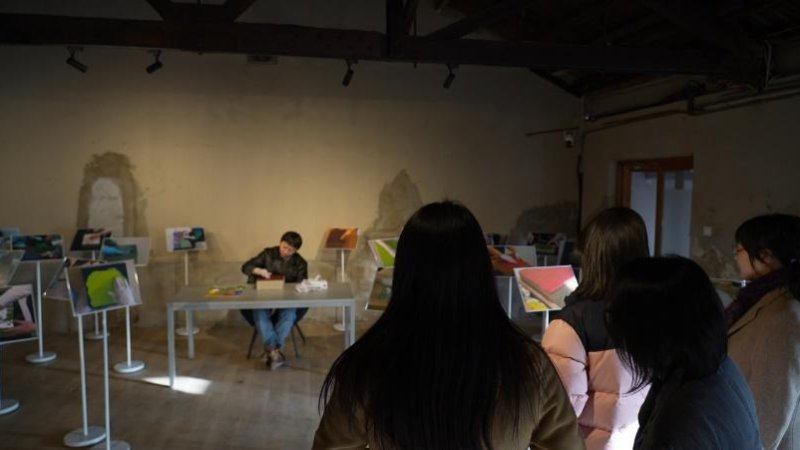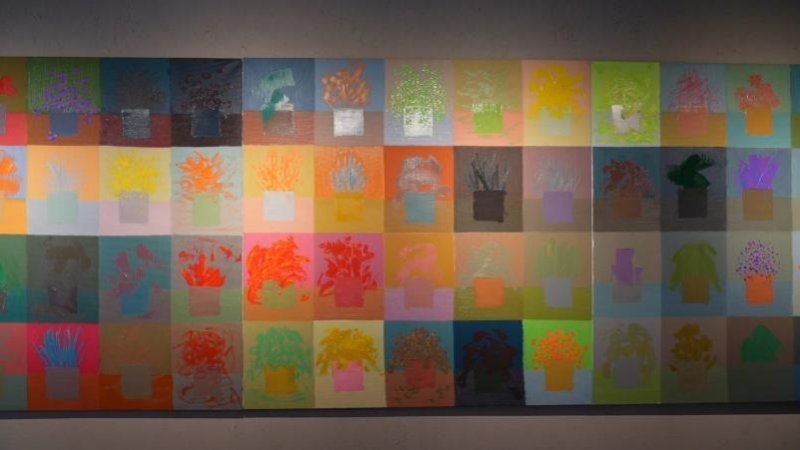By Peyton Turner
Exhibition Materials for Decheng
Cui Decheng: Metaphysics Solo Art Project
Curator: Song Tao
Exhibition Dates: February 15, 2025 – March 15, 2025
Location: Yuan Museum
Article: Yali Han
Academic Translator: Chenyang Nie

Photo Courtesy: Cui Decheng
On February 15, 2025, Yuan Museum will officially unveil Metaphysics, a solo art project by Cui Decheng, curated by Song Tao. This exhibition brings together three core chapters of Cui’s Metaphysics series—Sensibility and Rationality, Critique of Sensibility, and Critique of Pure Rationality. Navigating the tension between rationality and sensibility, the artist constructs an immersive experience that delves into consciousness, cognition, and artistic creation. Through diverse media, including painting, AI interactive installations, and performance art, Cui explores and interprets these philosophical themes. The Metaphysics series consists of four chapters, and the three featured in this exhibition represent the core themes of his long-term creative practice. The series originates from the artist’s profound contemplation of mortality—an attempt to counteract existential nihilism through artistic creation and to seek spiritual transcendence within the finitude of life. This artistic pursuit serves both as a personal solace and a philosophical exploration, embodying a redemptive and investigative process.
Cui’s continuous artistic journey reflects not only his insights into individual existence but also his philosophical inquiries into life itself. He poses fundamental questions: When art becomes a “game of reason,” does it still retain its impulse of sensibility? Conversely, when sensibility dominates creation, does rationality erode its deeper critical power? It is through such reflections that Cui’s work transcends formal constraints. Employing painting, printmaking, sculpture, and performance, he investigates the dynamic interplay between the force of sensibility and the rigor of rational thought. His work responds to Immanuel Kant’s philosophical explorations in Critique of Pure Reason and Critique of Practical Reason, where Kant posits that sensibility provides empirical material while reason imposes a priori structures, together shaping the boundaries of human cognition. However, in Cui’s practice, sensibility and rationality do not exist in opposition but rather in a state of interwoven tension—sensibility as the intuitive experience of art and rationality as its conceptual framework.

Photo Courtesy: Cui Decheng
Color Matrix , Digital interactive art
This exhibition will feature two major works making their debut: the interactive AI piece Color Matrix and the performance piece Arty. Color Matrix, part of the Critique of Sensibility chapter, is a collaboration between Cui and software engineers Hu Xuefeng and Milton Ren. This piece allows viewers to generate algorithmically constructed images by selecting and combining colors, creating compositions reminiscent of the exhibited works. The AI generation process resonates with Kant’s concept of the “categorical imperative” from Critique of Practical Reason—an exploration of how individuals should act under absolute moral laws and how happiness is sought within these constraints. Color Matrix investigates the interplay between individual choices and absolute moral imperatives, producing moments of chance within structured decision-making. Kant argued that sensibility alone, being particular and empirical, cannot yield true understanding, let alone insight into the workings of the world. Through Color Matrix, Cui extends Kant’s philosophical framework into the realm of artistic creation, demonstrating how art becomes a bridge between rational critique and sensuous experience.
Viewers engage with the artwork through their own aesthetic perception, further understanding the essence of the artist’s creation and the intrinsic logic of image generation through rational mathematical models. The AI experience not only extends the artist’s creative intent but also serves as a window for dialogue between the artist and the audience. Cui Decheng excels not only in artistic expression but also in communication. When engaging with Kantian philosophical inquiries, he opts for direct, tension-filled expressions. In the “Critique of Pure Rationality” chapter, the performance piece Arty satirizes the absurdity of a world governed purely by reason. Using his fingers to apply oil paint, Cui repetitively smears, rubs, and layers colors, allowing each layer to dry over a period of nearly a month before applying the next. This painstakingly repetitive action mirrors the endless labor of Sisyphus—an act seemingly futile yet profoundly existential. The monotonous, exhaustive painting process symbolizes human resilience and struggle against predetermined fate. In this piece, the artist critiques the limitations of pure reason from the standpoint of sensibility, exposing its rigidity and ultimate futility.

Photo Courtesy: Cui Decheng
Arty, Performance Art
Indeed, these two works form a subtle conceptual contrast—while Color Matrix employs algorithms to guide viewers through the structured logic of rational order, Arty emphasizes the futility of rationality through relentless manual repetition. In this tension, the audience becomes both an active participant and a guided thinker, experiencing the fusion and conflict of sensibility and reason within an artistic framework. In addition to these works, the exhibition presents Cui’s longstanding series of paintings, which continue his inquiries into the essence of art. These pieces juxtapose structured rational compositions with the fluidity of sensibility, layering color arrangements alongside algorithmic decision-making. The resulting numerical relationships oscillate between order and chance, transforming visual expression into a material trace of thought—a convergence of personal experience and philosophical reflection.

Photo Courtesy: Cui Decheng
Vases Family, Oil painting on canvas
This exhibition at Yuan Museum marks Cui Decheng’s first solo museum show in Beijing. Whether through the AI-generated Color Matrix, the existential irony of Arty, or the visual interplay of rationality and sensibility in his paintings, Cui’s artistic practice consistently revolves around one central question: How does art position itself between sensibility and rationality? This exhibition serves as an in-depth exploration and response to that question, offering a reflection on the evolving nature of art in an era where technology and ideology continuously intersect.
Curator
Song Tao
Director of Yuan Museum | Artist | Curator
Born in 1969 in Shanghai, Song Tao studied graphic design and painting at the Central Academy of Arts and Crafts, graduating in 1986. He earned a Master’s degree in Fine Arts from Université Paris 1 Panthéon-Sorbonne in 1993 and returned to China in 1994, founding TAO Gallery, where he organized numerous exhibitions for outstanding contemporary Chinese artists. In 2019, he established Yuan Museum; 2019-2022 Chief Curator of Design Spring at the Guangzhou Furniture Fair; 2022 Chief Curator of the China Pavilion at the London Design Biennale; 2023 Curator at Milan Design Week, Venice Design Week, and Paris Design Week; 2024 Chief Curator of the China Pavilion at Paris Design Week
Artist
Cui Decheng
Born in 1990 in Qingdao, Cui Decheng earned a Master’s degree in Fine Arts from the School of the Art Institute of Chicago in 2020. In 2022, he founded 4C Gallery in Los Angeles, dedicated to contemporary conceptual art. Cui’s work explores the intersections of rationality, perception, and human cognition, drawing from philosophy and physics. His Metaphysical Series, an ongoing four-part project, incorporates painting, installation, and performance to examine the limits of knowledge. His works have been exhibited at the Czong Institute for Contemporary Art in Korea, Google in Silicon Valley, and major contemporary art spaces in the US and China.
This article, written by Peyton Turner, was published by Rachel Hamilton.